
“What noon produces must be exquisite” has once become quite a popular slogan, bringing both honor and pressure. However, many of the works released by Noon Sunshine in the past two or three years have disappointed audiences, with titles like The Timing of Our Encounter, Ode to Joy 3, Ode to Joy 4, and Ode to Joy 5 all falling far short of expectations, some even airing with little to no attention. All these dramas are urban stories, and coincidentally, they are all directed by Jian Chuanhuo, which naturally raises concerns among viewers about yet another urban drama directed by him, Song of Ordinary People.

Song of Ordinary People poster
Regardless, Noon Sunshine maintains a high level of production quality, and the reputation of Jian Chuanhuo's series largely depends on the skill of the writers; he simply cannot turn a poor script into gold. Song of Ordinary People is adapted from Ji Jingrong’s novel I Am Not Useless, which she also authored. Although Ji Jingrong is considered a newcomer in the screenwriting industry, her novels are rich in detail; the previously well-received urban drama If Running Is My Life was adapted from her work. The cast of Song of Ordinary People is indeed impressive, leaving no reason not to check it out.
Song of Ordinary People tells the stories of three couples living in Beijing as they confront their respective life challenges, facing their inner selves and navigating through crises together.
The first couple, Shen Lin (played by Yin Tao) and Na Wei (played by Wang Xiao). Na Wei is at the peak of his career when unexpected company upheaval leaves his professional life in turmoil; after being a full-time housewife for five years, Shen Lin decides to return to the workforce, facing a challenging and uncertain path to reemployment.
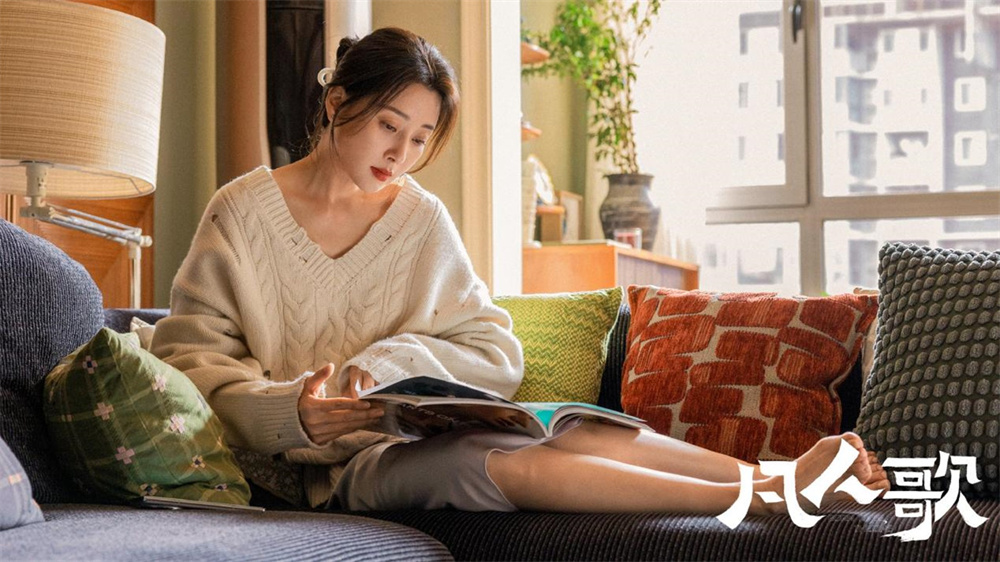
Shen Lin (played by Yin Tao)
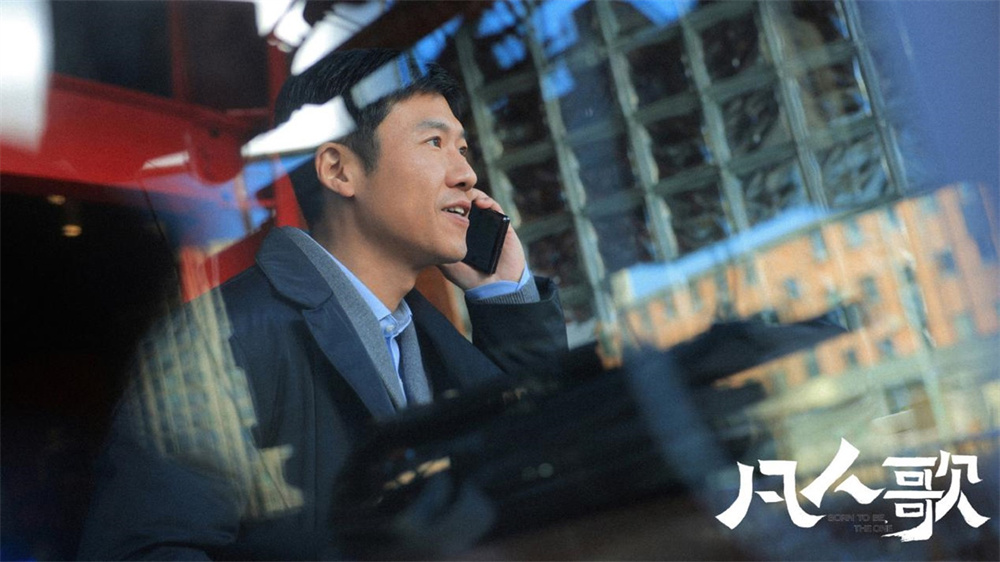
Na Wei (played by Wang Xiao)
The second couple, Shen Lei (played by Qin Junjie) and Xie Meilan (played by Chen Haoyu). Shen Lei is a top student from a prestigious university and a civil servant with an average salary, living a laid-back life, while Xie Meilan works in an investment company. Their differences in future planning keep widening, drifting their relationship apart.
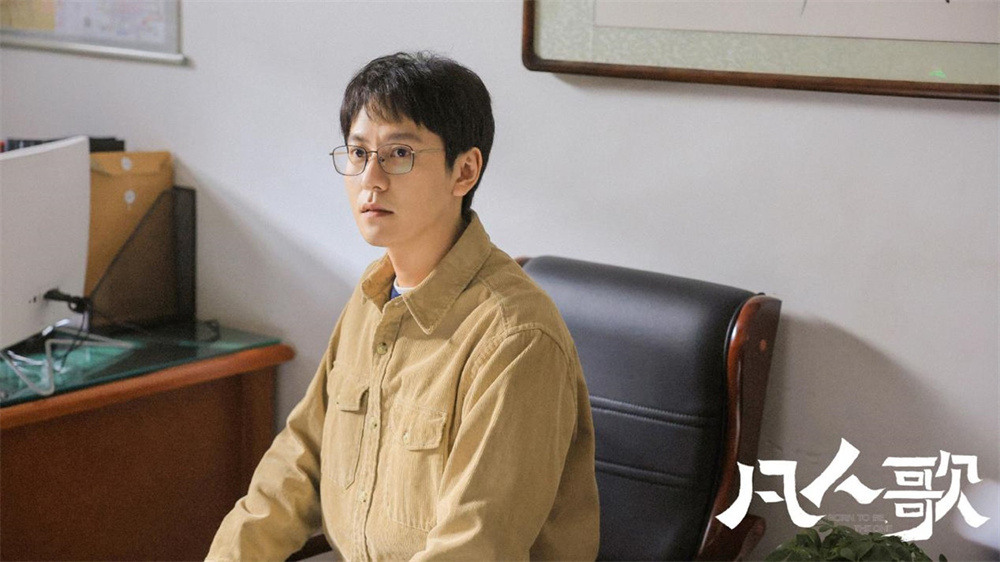
Shen Lei (played by Qin Junjie)

Xie Meilan (played by Chen Haoyu)
The third couple, young lovers Na Jun (played by Zhang Zhehua) and his girlfriend Li Xiaoyue (played by Zhang Ruonan). Na Jun is a programmer earning over a million a year and is overly competitive; Li Xiaoyue is a regular office worker who despises the overtime culture, and their conflicting values overshadow their relationship.
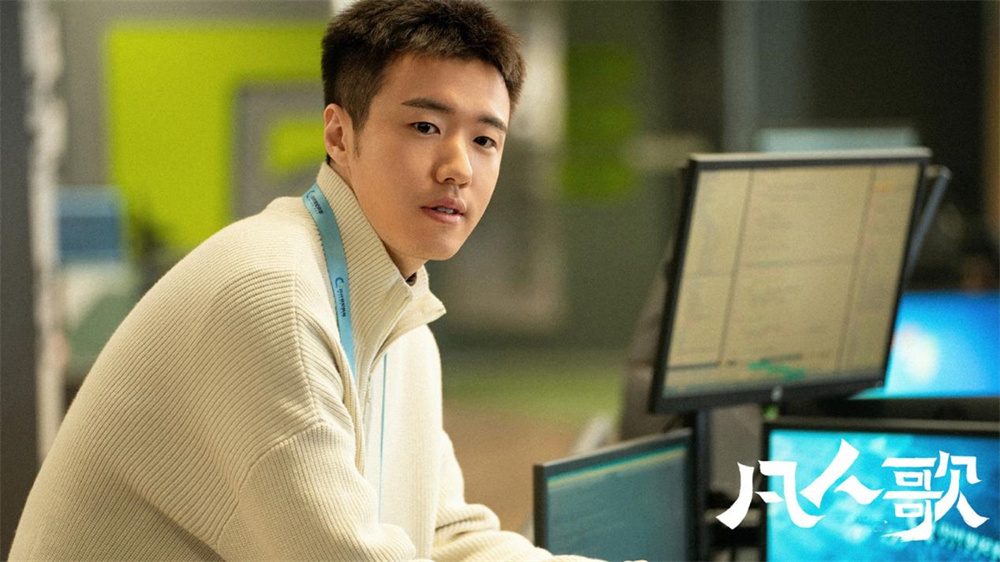
Na Jun (played by Zhang Zhehua)
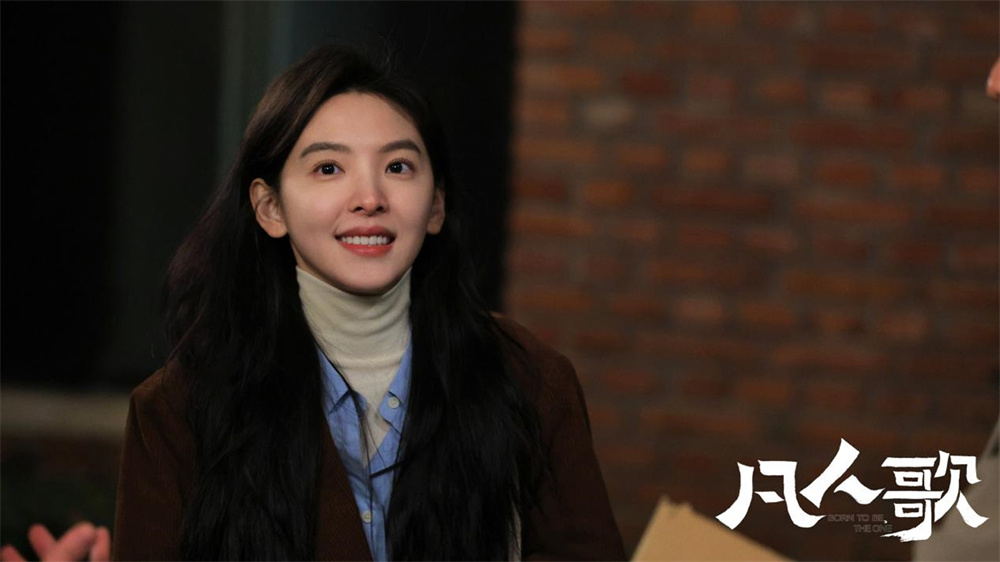
Li Xiaoyue (played by Zhang Ruonan)
Naturally, these three pairs of relationships are interrelated: Shen Lin is Shen Lei's sister, and Na Wei is Na Jun's brother... The character relationships in this urban ensemble drama follow the typical template of different archetypes coincidentally coming together.
As expected, the scriptwriter incorporates various trending issues into the relationships between different groups of characters. For instance, for the couple Na Wei and Shen Lin, keywords include midlife crisis, middle-aged unemployment, and full-time housewives; the differences between Shen Lei and Xie Meilan reflect various dilemmas, such as a choice between being laid-back or pragmatic, stability versus wealth, whether to buy a house or rent, and the feasibility of having children for renters; while Na Jun and Li Xiaoyue's relationship primarily revolves around differing workplace and life values, questioning if being overly competitive is right, or whether to refuse overtime culture, and so on.
Currently, almost all urban dramas attempt to generate buzz through trending topics. Certain plot points or character actions are often designed to provoke discussion and controversy, easily resonating with viewers’ emotions or sparking heated debates. Promotion strategies create various trending topics to increase the dramas' exposure.
Song of Ordinary People is no exception. Many trending topics surrounding this drama are quite “cheesy” and clearly intended to entice clicks. Examples include “Is it wrong not to want to have children in a rental?”, “The three major killers of marriage: lack of ambition, stinginess, and no romance”, “Wang Xiao and Zhang Ruonan meet their daughter's boyfriend's father”, “Xie Meilan's abortion”, and so forth.
Moreover, many viewers now watch dramas through trending searches and short video summaries, causing urban dramas to often morph into a mere collection of topics and conflicts, losing the nuance and layers present in the script. The conversations, scene transitions, and character interactions carefully designed by excellent writers get reduced to a handful of catchphrases or simplistic descriptions, rendering the originally rich plots dry and lifeless.
In conclusion, the character setup, attention to current issues, creation of trending topics, and the superficial consumption of short video summaries in Song of Ordinary People may easily mislead audiences into thinking it is just another typical, formulaic urban drama obsessed with sensationalism and devoid of logic.
However, despite the cheesy trending topics, Song of Ordinary People does possess subtlety that slightly distinguishes it from various cliché urban dramas.
Let’s focus on the most discussed conflict between Shen Lei and Xie Meilan from trending topics.
Shen Lei's character aligns with the older notion of being “laid-back” or “Buddha-like.” As a civil servant, his income is quite average at 8,000 a month. He is not enthusiastic about social activities but prefers to immerse himself in his own world, spending time on chores, cooking, and tending to his plants.
This personality leads him to adopt a conservative approach when facing major household expenses, like buying a car or a new house; he is reluctant to take on heavy financial burdens and thus prefers a “budget-friendly” lifestyle.
Xie Meilan, working as an investment manager in a national trade CBD, is a woman with opinions and aspirations. She is dissatisfied with the status quo and desires a better life, wanting to buy a car and move to a better living environment.
She is also a filial daughter, but Shen Lei’s “pragmatic” attitude, based on financial considerations in handling his mother-in-law’s illness and posthumous affairs, leaves her disappointed and cold at heart.
Amid an accumulation of disappointments, although Xie Meilan is pregnant, she decides not to reveal this to Shen Lei and chooses to undergo an abortion alone…
In trending discussions and short video reviews, the transition from Shen Lei and Xie Meilan being a loving college couple to their division is simplistically framed as a sensational highlight: “The domineering CEO falls for a woman undergoing an abortion”, “Shen Lei is just a stingy guy”, “Xie Meilan is a gold digger”, and so on.
But to be fair, the scriptwriter’s portrayal of the complexity of this character relationship goes beyond the crude summaries. For example, a frequently appearing prop in the drama is Shen Lei’s electric bike.
Shen Lei owns a rickety electric bike, which he uses to take Xie Meilan to work in the central business district every morning. One day, they are stopped by traffic police. Xie Meilan suggests buying a car, but Shen Lei disagrees, citing issues like illegal leasing of license plates, high costs after purchase, and the lack of parking spaces as unnecessary hassle and expenses.
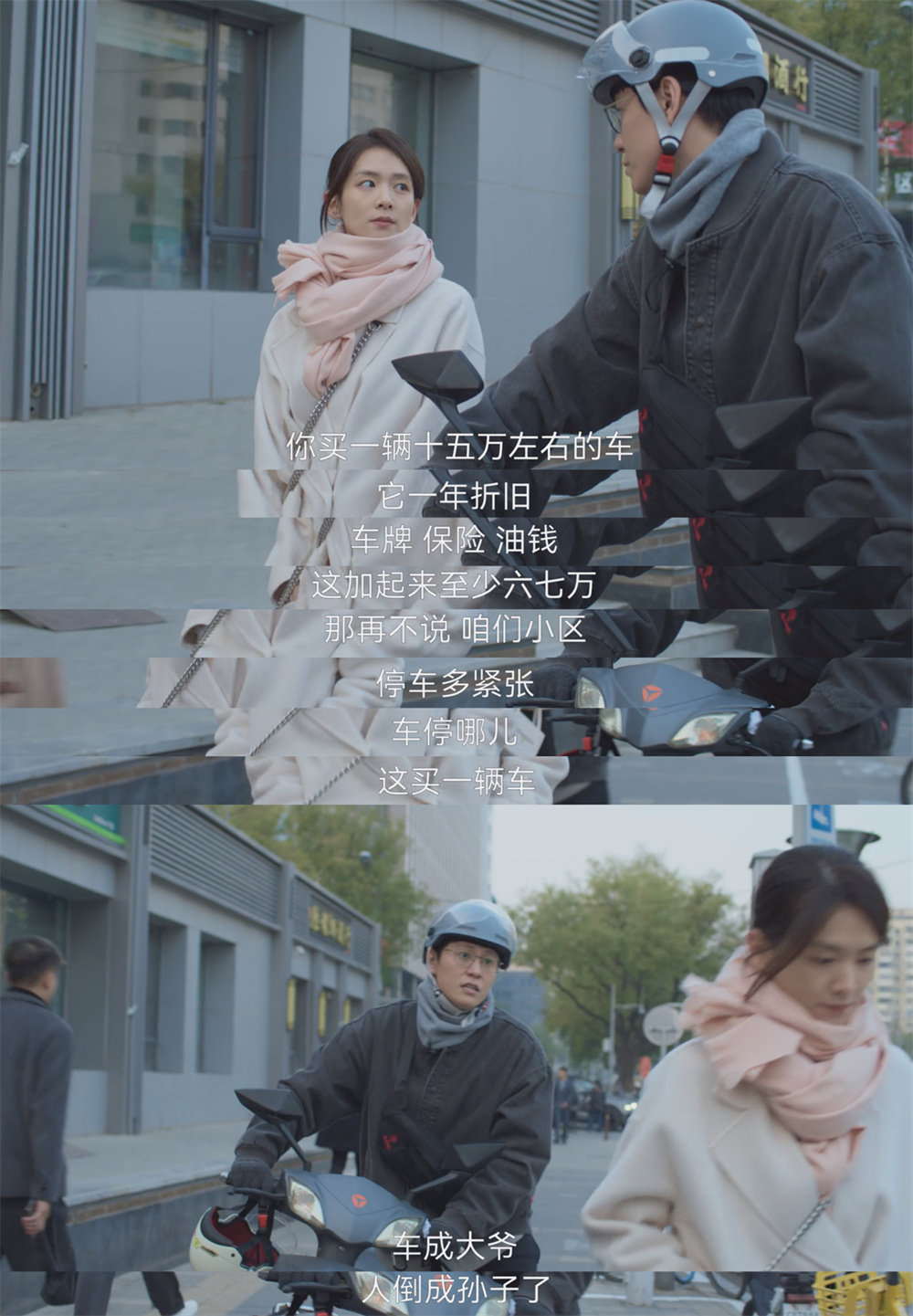
Shen Lei is unwilling to buy a car
When Shen Lei suggests getting a bike for Xie Meilan, she is not interested, thinking that commuting on an electric bike to the CBD is not stylish.
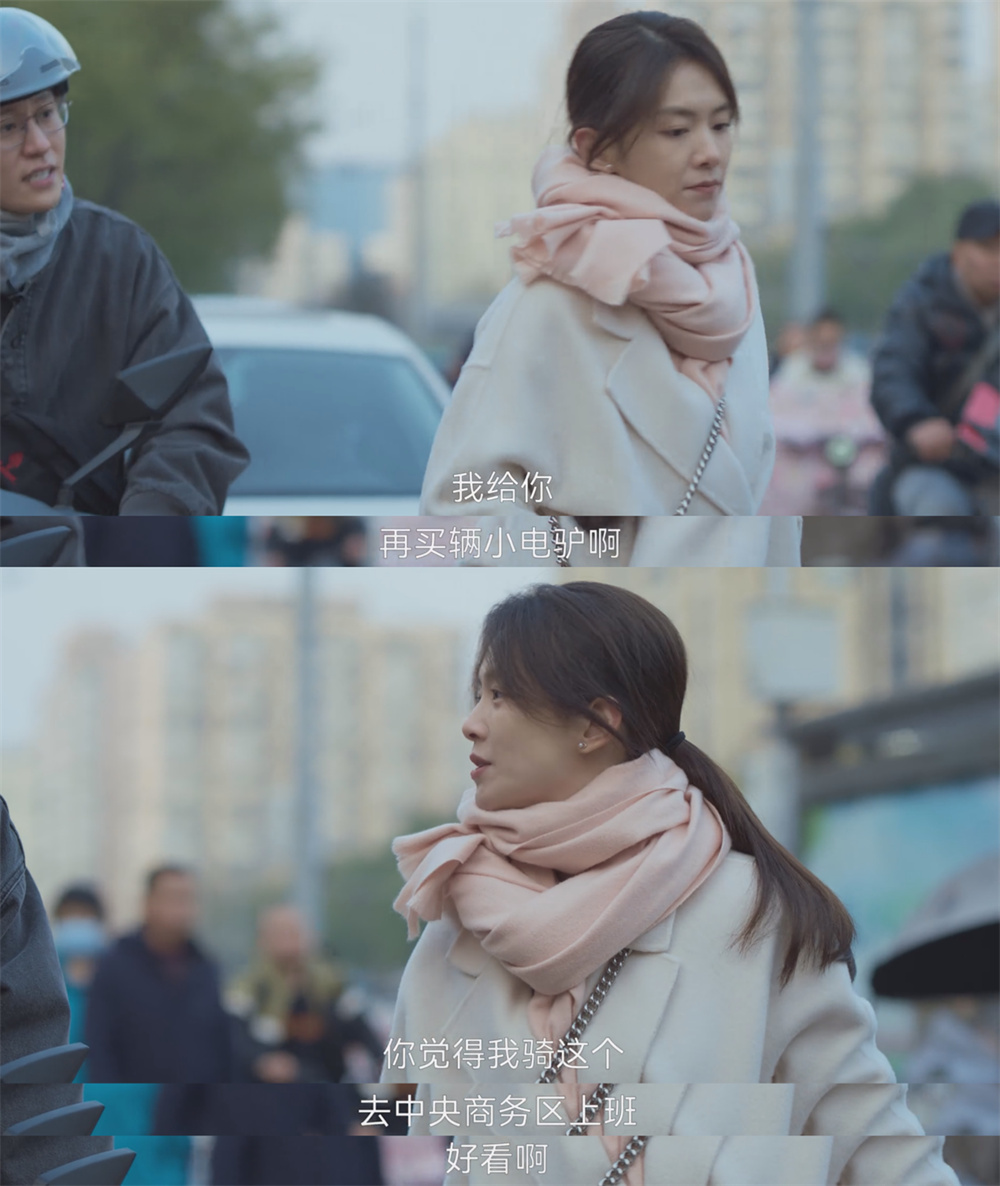
Xie Meilan thinks commuting on an electric bike is embarrassing
This scene highlights their differing life philosophies: Shen Lei is content with a “small fortune”, while Xie Meilan pursues comfort and quality of life. Both perspectives are understandable.
This electric bike appears later in the plot. After Xie Meilan becomes pregnant, she intends to tell Shen Lei. Before breaking the news, she suggests that they move to a larger apartment to improve their living conditions, but Shen Lei thinks a bigger apartment is unnecessary, citing their limited income and the need to save money and pay off debts.
Frustrated, Xie Meilan says, “I’m telling you, you won’t be able to save money forever.” At that moment, the electric bike outside suddenly makes noise again; previously, there was detail foreshadowing — this old bike occasionally produces random sounds.
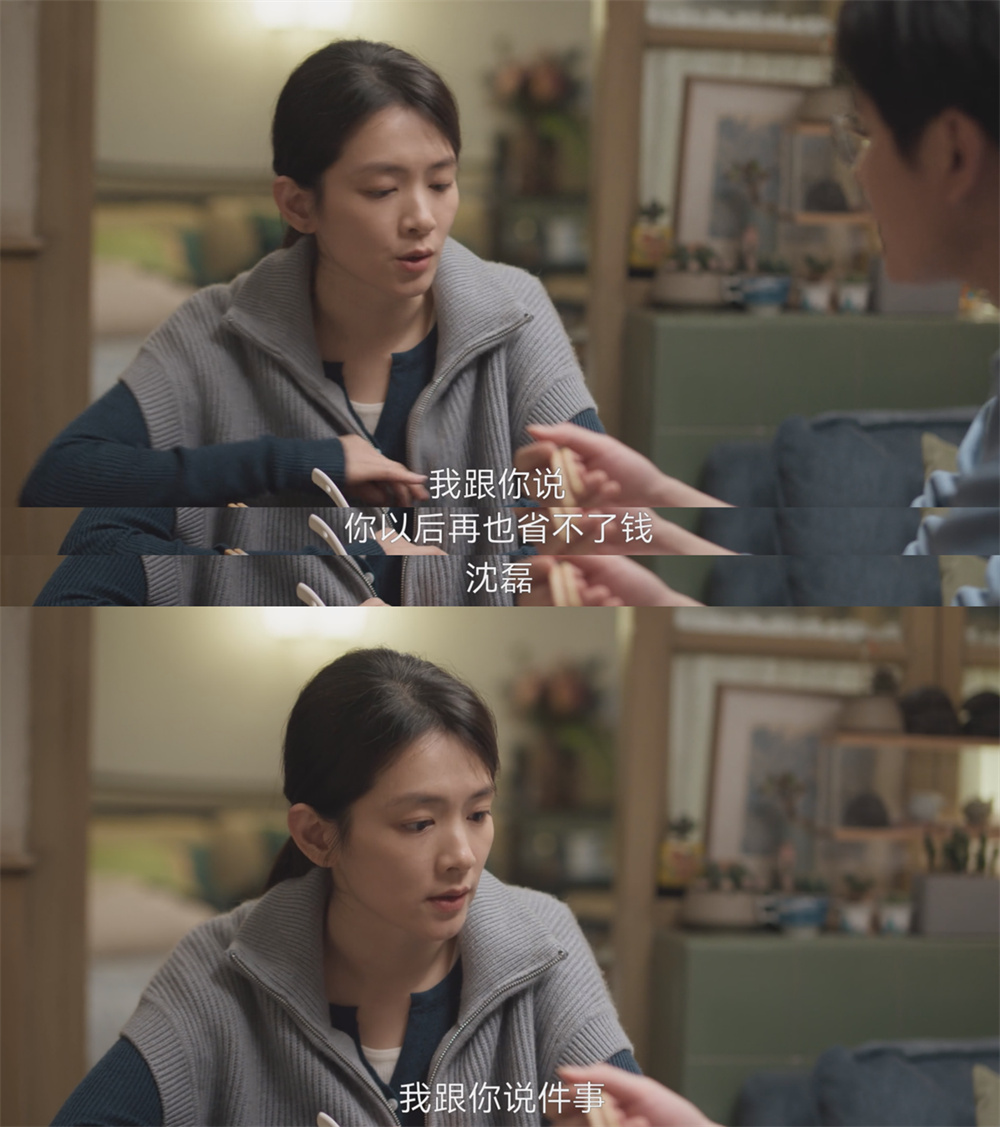
Xie Meilan was about to tell Shen Lei about her pregnancy
Xie Meilan had intended to share her pregnancy news, a pivotal moment in family life, but it was interrupted by the seemingly trivial distraction — the noise of the old electric bike. This cleverly reveals their ideological differences and how minor daily tensions can hinder understanding and emotional exchange.
It also reflects the helplessness and randomness of real life; even among the closest of relationships, crucial moments of communication may be missed due to external factors. Their subsequent separation has both inevitable and accidental elements.
Another detail devoid of trending significance involves Shen Lei restoring old documents.
Shen Lei works in the archives department at his company, and while a colleague named Zhou Yu, who usually handles restorations, is still away, Shen Lei takes the initiative to start restoring some less complicated documents and even takes them home to work on.
Before Xie Meilan discusses this with Shen Lei, the scene cuts to Xie Meilan coming home late at night. As she strides toward her residence, she stops for a moment, gazing at the lights in their old rental house, taking a deep breath as if gathering courage or shedding a burden before trudging back home.
This shot, if removed, would not affect the plot’s progression at all. However, including it makes Xie Meilan’s character more three-dimensional and open to interpretation. Her sigh and slowed pace could indicate frustration and dissatisfaction with Shen Lei's contentment in renting, or it might hint at an unresolved affection for him — regardless of when she returns home, there is always a warm light waiting for her in their little space.
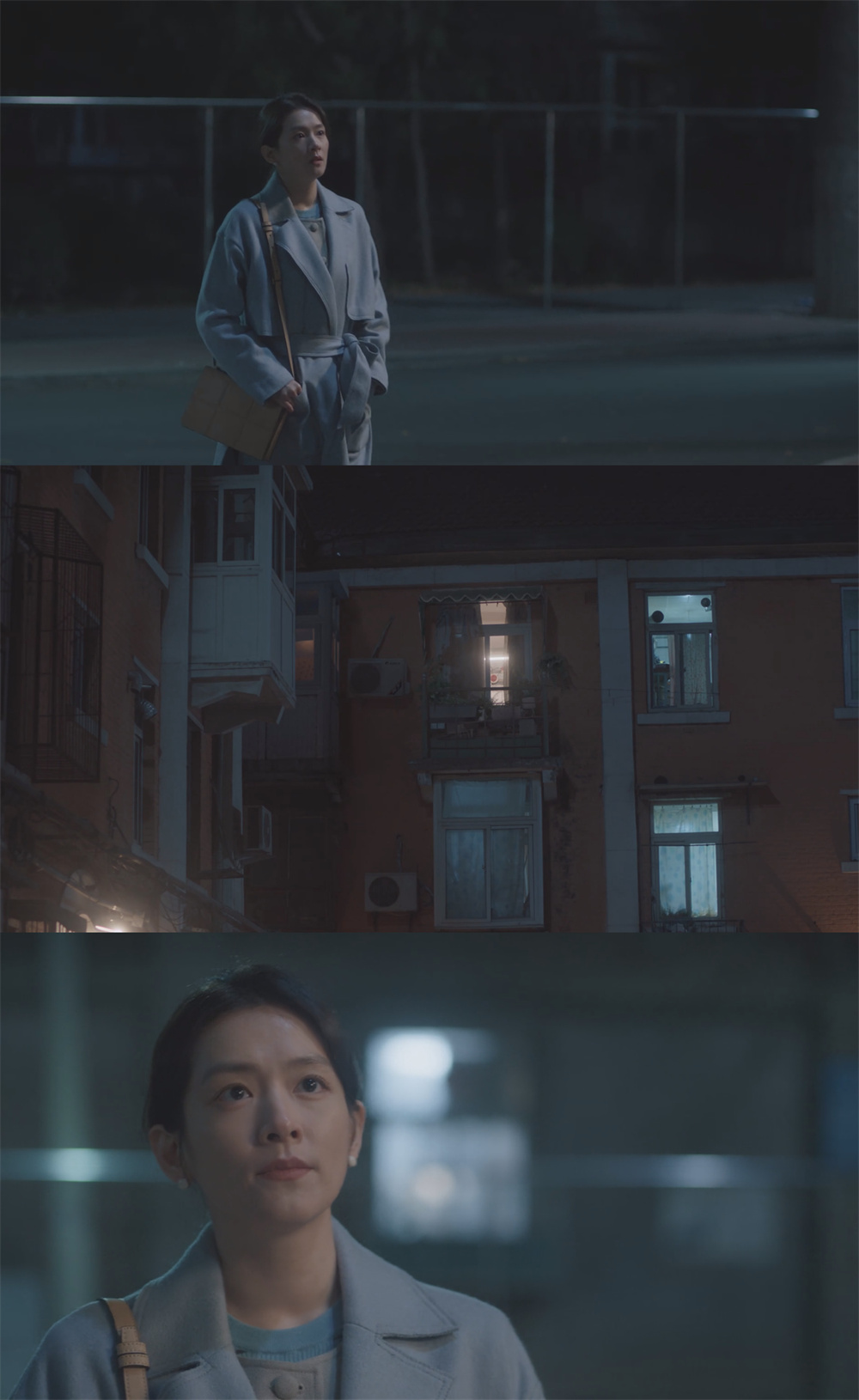
Xie Meilan gazes at the lit rental apartment
Upon entering, Xie Meilan sees Shen Lei working on document restoration. He believes these documents are invaluable beyond monetary measure, holding historical, documentary, and ideological significance. Xie Meilan interrupts him, asking, “Don’t they pay you more for this?” Shen Lei replies, “No, but don’t you think it’s meaningful?” Xie Meilan looks dismissive.


